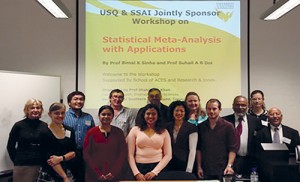Meta-Analysis Workshop Hosted by University of Southern Queensland
Shahjahan Khan, University of Southern Queensland
The school of agricultural, computational, and environmental sciences and the division of research and innovation at the University of Southern Queensland (USQ) hosted a workshop titled “Statistical Meta-Analysis with Applications” in collaboration with the Statistical Society of Australia Inc. at the USQ Ipswich Campus June 16–17.

Participants and presenters of the meta-analysis workshop at the University of Southern Queensland, Australia
The organizer of the workshop, Shahjahan Khan of USQ, opened the inaugural session with an introduction of the meta-analysis within the systematic review and evidence-based decision-making process and the role of statistical methods in synthesizing data from independent studies. He also highlighted applications of meta-analysis in medicine, agriculture, education, and business and discussed issues related to methods of allocation of weights under various models in the estimation of common effect size of meta-analysis.
Bimal Sinha of the University of Maryland and Suhail Doi of Australian National University gave invited talks.
Sinha began with motivating buy ativan cyprus real-life examples of data leading to the definition of measures of various effect sizes for continuous and binary outcome variables. He covered all commonly used estimators of common effect size and discussed their variance estimators and confidence intervals. He also discussed inference about the common mean of univariate normal distribution, publication bias, vote-counting procedures, and heterogeneity, along with the random effects (RE) model and meta-regression.
Doi highlighted the main purpose of meta-analysis and focused on problems inherent with conventional statistical meta-analysis, especially unfair redistribution of more weights to smaller studies under the random effects model. Under the title “Recent Advances in the Methodology of Statistical Meta-Analysis,” he presented the inverse variance heterogeneity estimator as an alternative to the RE model estimator and introduced the quality effect model estimator based on his recent publications. Through extensive simulation examples, he demonstrated the advantages and appropriateness of the new estimators.
Twelve participants from government, industry, and academia throughout Australia attended the workshop.

















